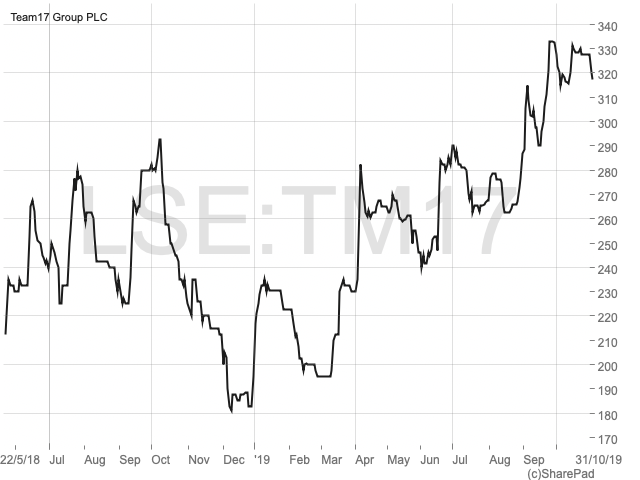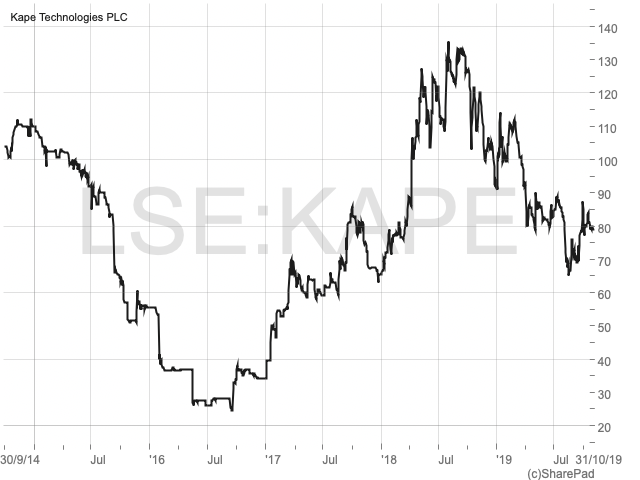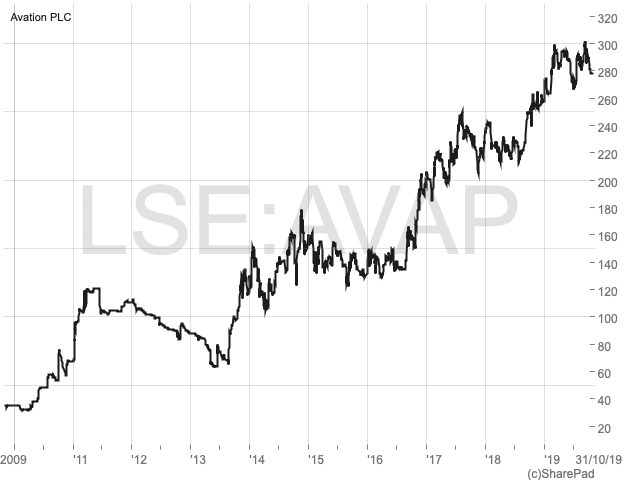What a result! Great numbers from three top-performing small caps

Richard Gill, CFA, looks at three small-cap companies that posted strong results in early autumn.
After the traditionally quiet summer months, the London financial markets have sprung back into life, so let’s get straight into what I consider to be some of the best small-cap numbers of the early autumn.
TEAM17
Video games are big business. According to a recent report from market-intelligence company Newzoo, the global games market is expected to be worth over $150 billion in 2019, growing to more than $196 billion by 2022. That makes itlarger than both the music and cinema industries combined.
| First seen in Master Investor Magazine
|
Taking advantage of the gaming boom is AIM-listed Team17 (LON:TM17), a global games label, and creative partner and developer of independent, premium video games. It earns money by partnering with independent games makers around the world in the development and publishing of their content, across multiple platforms, typically earning a fixed revenue share after the game is launched.
Essentially, the business model sees Team17 reviewing the work of independent developers and commercialising what it considers to be the best ideas. That makes it a bit like an independent record label, although the company does also have its own intellectual property, some of which has been acquired and some developed in house. There is a strict review process to filter out the best third-party games, with only around1.5% of games reviewed in 2017 eventually signed to the company’s ’games label’.
In contrast with some of its peers, Team17 focuses on premium, rather than free-to-play games. The portfolio currently contains over 100 titles, with back-catalogue sales delivering a strong residual income stream. The company is perhaps best known for its popular turn-based strategy game Worms, which was developed in house, first released in 1995 and has gone on to be a successful franchise. Other popular games include cooking game Overcookedand prison strategy title The Escapists. Also, around 88% of revenues are generated from digital sales, meaning that the company has a high level of control over pricing and game-lifecycle management, with minimal additional development costs post launch.
Team17 joined AIM in May 2018 and raised a total of £107.5 million at 165p per share in a placing described as “multiple times oversubscribed”. Of this amount £42.8 million net was raised for the company itself and used to repay loans, with the remainder going to selling shareholders. These included chief executive Debbie Bestwick, who was awarded an MBE for services to the video- games industry in 2016; sheretains a stake in the business of around 22%.
Game on
Team17 came to market with some good growth figures, showing revenues rising at a compound annual rate (CAGR) of 69% and an adjusted EBITDA CAGR of 80% for the three years to 31 December 2017. The strong growth has continued post IPO, with the company revealing perhaps some of the best results seen from an AIM company during this current results season.
For the six months to June 2019, revenues were up by a stonking 97% to £30.4 million.This was driven by a number of new releases during the period including farm-life simulator My Time at Portia which achieved a number one ranking on digital distribution platform Steam in January before a successful console launch in April. Hell Let Loose, a World War II military simulation, was the games label’s first 100-person multiplayer game and also reached number one globally via Steam Early Access in June. In addition, there was a continued strong performance from the back-catalogue portfolio, which contributed 73.7% of revenues.
At the bottom line, pre-tax profits were £10.36 million, up from just £31,000 in H1 2018 and even ahead of the £8.7 million posted for the whole of 2018. On the balance sheet, net cash stood at £35.8 million at the period end, boosted by a £13.7 million net inflow from operating activities – this is highly cash-generative business. However, while there is said to be a “solid” line up of new releases due from partners, revenues in the second half are expected to be lower than in the first half due to the planned spread of releases over the year.
Hitting the right buttons
Shares in Team17 have performed extremely well since IPO, rising by 79% to the current price of 296p. That capitalises the business at £389 million and on a forecast earnings multiple for 2019 of 30 times. However, considering this excellent track record, and solid foundations for growth and opportunities in the games market, I believe that this could be one for the long term.
As mentioned previously, the video-games market is forecast to grow strongly over the coming years, and with nearly £36 million on the balance sheet Team17 looks well placed to continue its upward profit trajectory. This is a business with growth ambitions, with headcount increased to 164 from 154 in the first half of 2019 and a development studio relocation planned for H2 to a larger site with increased capacity. Underpinning potential growth is the solid back catalogue of games, which provides high-margin income and the opportunity for follow-on titles from existing franchises – Wormsfor example still makes the company around £5 million in revenues every year, almost 25 years after being launched.
While no dividend has been confirmed, the company has considered implementing a progressive policy in future years subject to sustained profits being generated. However, given current growth rates, I would prefer capital to be retained to take advantage of investment opportunities. Broker Liberum raised its target for the shares to 330p after the interims (implying 11% upside) but I think that could be conservative in the longer term if historic growth rates continue.

KAPE TECHNOLOGIES
I first covered this next company in the April 2018 edition of this magazine. AIM-listed Kape Technologies (LON:KAPE) is a consumer security software as a service (SaaS) business which changed its name from Crossrider last year to reflect a shift in strategic focus. While the shares are down from 86.5p to the current 78.5p since my initial report, they have surpassed 135p during that time and investors have also enjoyed a special dividend of 3.55p per share. But with two acquisitions recently completed and the business making strong operational progress, I believe the story is worth revisiting.
Kape currently develops and distributes a variety of digital products in the online-security space, offering products which provide online security and privacy. Since my last report, Kape has disposed of its non-core media division, leaving app distribution as the core operating segment. Key subscription-based products include; CyberGhost, an online privacy application; Reimage PC/Mac, which can fix a PC or Mac and restore peak performance via the internet with 24/7 support; and DriveFix, which scans computers for outdated drivers.
| First seen in Master Investor Magazine
|
Expanding its suite of products, Kape made two complementary acquisitions in 2018, putting to use some of the £45.9 million it raised at IPO in 2014 but hadn’t really touched since. July last year saw the $16 million purchase of Intego, a leading Mac and iOS cybersecurity and malware protection SaaS business, headquartered in Seattle.. Then in October, the company bought ZenMate for €4.8 million. This is a digital privacy company, headquartered in Berlin, focused on encrypting and securing internet connections and protecting individuals’ privacy and digital data.
Kape crusader
While Kape announced in July that its interim results would be in line with expectations, the shares oddly fell by around 20% over the next two weeks. Investors had nothing to fear, however, as the final numbers showed revenues up by 24% to $29.9 million for the six months to June.
Kape now has over one million subscribers across its product base, up 24% over the previous year, with the customer-retention ratio improving from 74% at the end of 2018 to 82% − one of the highest in the consumer SaaS space. Notably, recurring revenues more than quadrupled to $21.2 million, providing strong visibility of earnings. Elsewhere, both of the acquired businesses were said to be performing in line with expectations, with $1.7 million in annualised cost savings identified in ZenMate.
At the adjusted EBITDA level (relevant for Kape given high non-cash charges) profits grew by 21% to $5.8 million. The balance sheet remained strong with cash of $36.4 million as at 30 June and no debt. The outlook for the second half was positive, with management saying it remains confident in delivering year-on-year growth for the current financial year, in line with market expectations.
Hack into growth
Theinterim results showed how ambitious Kape is. Comments from chief executive Ido Erlichman, included: “We have significant ambitions for Kape…”and …”we firmly believe much more is possible.” With profitable operations and a large cash backing, I believe that the company looks very well placed for further growth in the personal digital-safety market, which was estimated to be worth $10 billion in 2018.
Kape is currently being valued by the markets at £116 million. For the 2020 financial year, broker Shore Capital is looking for revenues of $83 million, pre-tax profit of $16.3 million and earnings of 9.2 cents (7.33p) per share. It’s worth noting that further earnings visibility comes from the sale of the media division, with Kape receiving a 50% share of EBITDA from the business for the next five years as consideration for the deal.
Assuming targets are met then the forward price earnings multiple is just 10.7 times for 2020. Strip out the cash balances and that falls to a very low eight times, at the bottom end of the wider software and computer-services sector.

AVATION
It’s not been a good month for some investors in the airline industry, with beleaguered Thomas Cook (LON:TCG) finally being put into liquidation in late September follow its high-profile problems. Other companies in the industry, however, have been benefiting from strong profit growth. One of those is Main Market-listed Avation (LON:AVAP), a firm well known amongst investors for having delivered very strong returns over the past decade or so. Initially listed on the old PLUS exchange and joining the LSE in October 2010, the shares have just about quadrupled since the market move.
Avation is a commercial passenger aircraft leasing company which owns and manages a fleet of aircraft which it leases to a range of airlines across the world. The company’s approach sees it enter into long-term leases with airlines, and after the initial lease period the aircraft are re-leased or can be sold. Major costs to Avation include expenses related to the depreciation of the aircraft as well as financing costs and general administration. Borrowings to finance aircraft purchases are high, with Avation’s net debt standing at just over $1 billion as at 30 June 2019. Nevertheless, this is a highly profitable business model, with costs reduced by airlines themselves being responsible for operating expenses like maintenance, insurance and fuel.
Current customers include a range of global and national airlines, such as Flybe, Virgin Australia, Air France and EasyJet. At the end of the last financial year, the fleet comprised 48 aircraft − with seven on finance lease, including ATR 72-600s, Airbus A321-200s and Fokker 100s. Reflecting further expansion plans, the company has orders for nine additional ATR 72-600 aircraft for delivery by 2022 and has purchase rights for a further 25 aircraft.
In order to keep the fleet up to date, Avation will typically sell mid-life and older aircraft and redeploy the capital to newer assets. The current weighted average age of the fleet is just 3.4 years and the weighted average remaining lease term is 7.5 years. The company is also an active trader of aircraft and will consider the acquisition or sale of individual or smaller portfolios of aircraft if a decent profit can be made,
Plane sailing
Investors cheered recent results for the year to June 2019, which revealed a record set of numbers across the board. At the top line, total revenues increased by 8% to $119 million after 12 aircraft were added to the fleet during the year and airline customers increased from 13 to 17. Pre-tax profits, however, rose by a more pronounced 35% to $25.6 million after the figures were boosted by a $10 million gain on the disposal of aircraft, offset by finance expenses rising by 23% to $55.3 million. At the period end, fleet assets increased by 22% to $1.27 billion after $329 million was spent on tangible asset purchases. Impressively, total dividends for the year were increased to 10.5 cents per share, a rise of 45%.
Shortly after the full-year results were released, shares in Avation hit an all-time high of just over 300p before slipping back to the current 293p. Fortunately, exposure to Thomas Cook’s demise is minimal, with just two Airbus A321 aircraft being leased to the collapsed carrier. Default notices have been issued, with repossession being carried out and the aircraft remarketed. Avation has stated it does not anticipate any material impact on operations from the events.
At the current share price, Avation is valued at £187 million, which for starters is a modest discount to net assets of $240.8 million (£193.7 million) as at 30 June this year. However, the true asset value could be higher, with management pointing out in the results that it believes,“…net realisable value per share exceeds the reported net asset value per share.”The historic earnings multiple is just over nine times, which looks incredibly cheapgiven the company’s track record. Also, a modest historic yield of 2.9% provides income attractions and should rise in line with the firm’s progressive payment policy.
Broker Canaccord Genuity confirmed a 350p target for the shares following the results, with analysts at WH Ireland going slightly higher at 352p. The higher of the two implies capital upside of 20% from current levels, but could prove to be conservative in my view, if growth rates continue at historic levels.

 Never miss an issue of Master Investor Magazine –
Never miss an issue of Master Investor Magazine –
Comments (0)